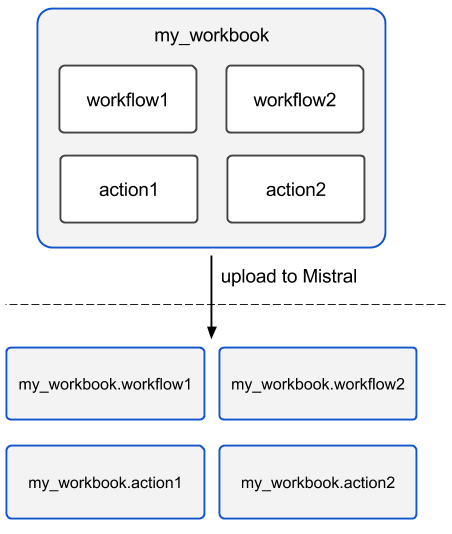Workbooks¶
Using workbooks users can combine multiple entities of any type (workflows and actions) into one document and upload to Mistral service. When uploading a workbook, Mistral will parse it and save its workflows and actions as independent objects which will be accessible via their own API endpoints (/workflows and /actions). Once it’s done the workbook comes out of the game. User can just start workflows and use references to workflows/actions as if they were uploaded without workbook in the first place. However, if need to modify these individual objects user can modify the same workbook definition and re-upload it to Mistral (or, of course, user can do it independently).
Namespacing
One thing that’s worth noting is that when using a workbook Mistral uses its name as a prefix for generating final names of workflows and actions included into the workbook. To illustrate this principle let’s take a look at the figure below:

So after a workbook has been uploaded its workflows and actions become independent objects but with slightly different names.
YAML example¶
---
version: '2.0'
name: my_workbook
description: My set of workflows and ad-hoc actions
workflows:
local_workflow1:
type: direct
tasks:
task1:
action: local_action str1='Hi' str2=' Mistral!'
on-complete:
- task2
task2:
action: global_action
...
local_workflow2:
type: reverse
tasks:
task1:
workflow: local_workflow1
task2:
workflow: global_workflow param1='val1' param2='val2'
requires: [task1]
...
actions:
local_action:
input:
- str1
- str2
base: std.echo output="<% $.str1 %><% $.str2 %>"
NOTE: Even though names of objects inside workbooks change upon uploading Mistral allows referencing between those objects using local names declared in the original workbook.
Attributes
- name - Workbook name. Required.
- description - Workbook description. Optional.
- tags - String with arbitrary comma-separated values. Optional.
- workflows - Dictionary containing workflow definitions. Optional.
- actions - Dictionary containing ad-hoc action definitions. Optional.
For more details about Mistral Workflow Language itself, please see Mistral Workflow Language specification